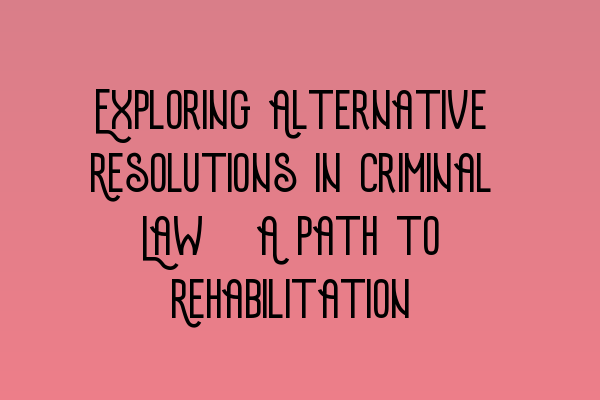Exploring Alternative Resolutions in Criminal Law: A Path to Rehabilitation
As criminal lawyers, our role extends beyond simply defending alleged offenders in court. We have a responsibility to consider the wider implications of criminal justice and explore alternative resolutions that prioritize rehabilitation over punishment. By embracing this approach, we can contribute to the overall well-being of society and foster positive change in the lives of our clients.
One of the alternative resolutions that has gained traction in recent years is restorative justice. Restorative justice focuses on healing the harm caused by criminal behavior by involving victims, offenders, and the community in a process of reconciliation and restoration. By facilitating dialogue and providing the opportunity for offenders to take responsibility for their actions, restorative justice allows for the potential of growth and transformation.
Another alternative resolution to consider is diversion programs. Diversion programs provide non-violent offenders with the opportunity to avoid the traditional criminal justice system by engaging in rehabilitative measures. These programs often include counseling, education, and community service, all aimed at addressing the underlying issues that led to criminal behavior. By diverting offenders away from formal prosecution, we can break the cycle of recidivism and contribute to their successful reintegration into society.
Drug courts are yet another option worth exploring. These specialized courts offer a holistic approach to addressing substance abuse-related offenses. Rather than focusing solely on punishment, drug courts provide comprehensive treatment and support services to individuals struggling with addiction. By combining judicial supervision with intensive drug treatment programs, drug courts seek to address the root causes of drug-related criminal behavior and help offenders reclaim their lives.
When considering alternative resolutions in criminal law, it is crucial to recognize the importance of risk assessment and management. Through thorough evaluation and analysis, we can identify individuals who are suitable for diversion programs or restorative justice processes. By tailoring our approach to fit the unique circumstances of each case, we maximize the potential for successful outcomes and ultimate rehabilitation.
Furthermore, adopting alternative resolutions aligns with evolving societal attitudes towards criminal justice. There is a growing recognition that punitive measures alone are insufficient in addressing the complex factors that contribute to criminal behavior. By prioritizing rehabilitation and reintegration, we can work towards preventing reoffending and ensuring a safer, more inclusive society for all.
At SQE Criminal Law & Practice Law UK, we are committed to exploring alternative resolutions in criminal law. Our team of experienced solicitors understands the profound impact that our work can have on the lives of both offenders and the wider community. By leveraging our expertise, knowledge of the law, and dedication to ethical practice, we strive to achieve outcomes that prioritize rehabilitation and foster positive change.
For more information on related topics, we invite you to read the following articles:
- Demystifying the Solicitors Qualifying Examination Format
- LLC Formation Made Simple: Step-by-Step Guide for UK Entrepreneurs
- LLC Formation: A Step-by-Step Guide for UK Entrepreneurs
- Business Regulations in the UK: A Comprehensive Overview
- Ethical Considerations in UK Law: Upholding Professional Standards
We believe that by embracing alternative resolutions, criminal law can become a catalyst for positive change. Together, we can contribute to a justice system that prioritizes rehabilitation and works towards a brighter, more inclusive future.
